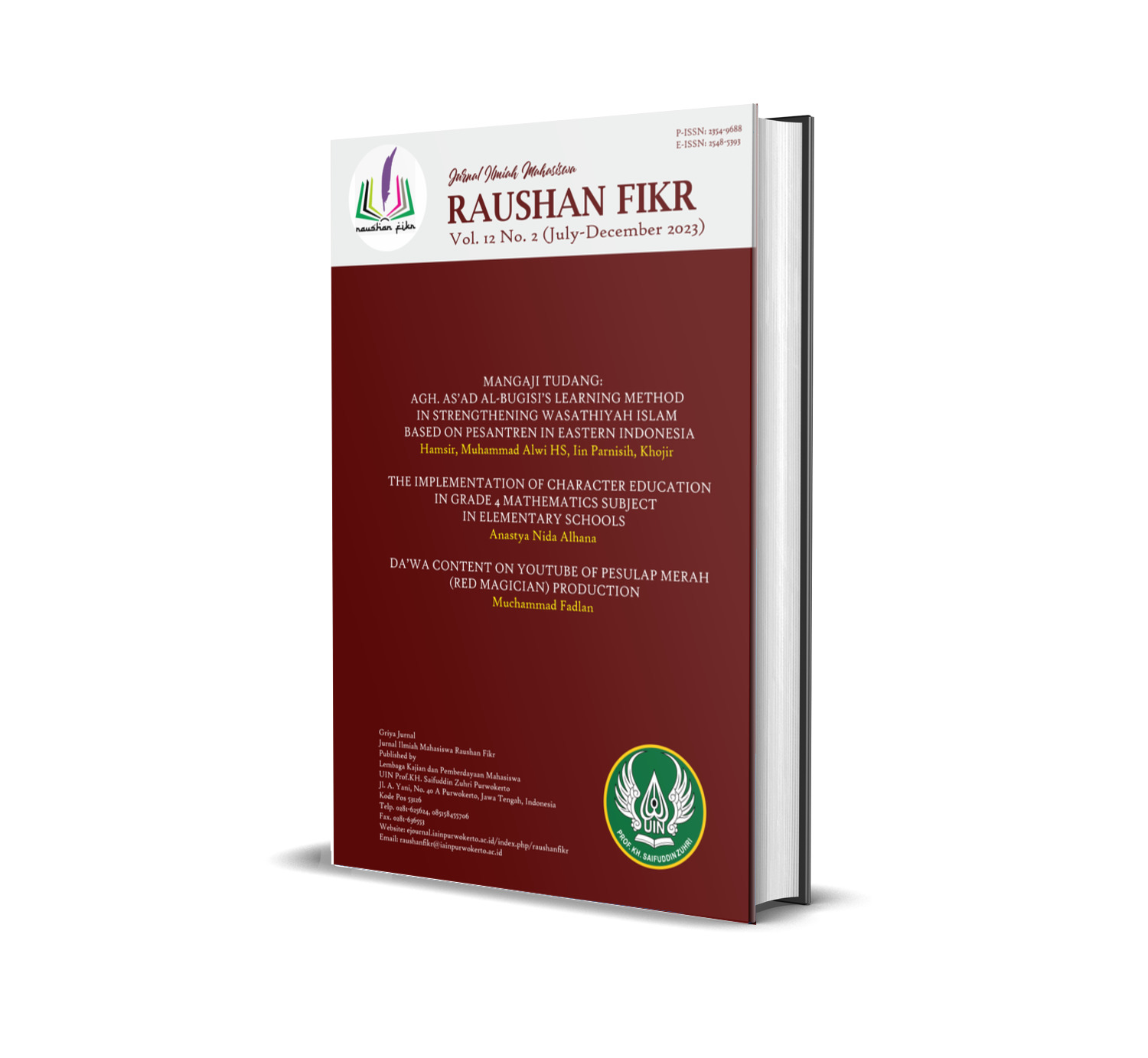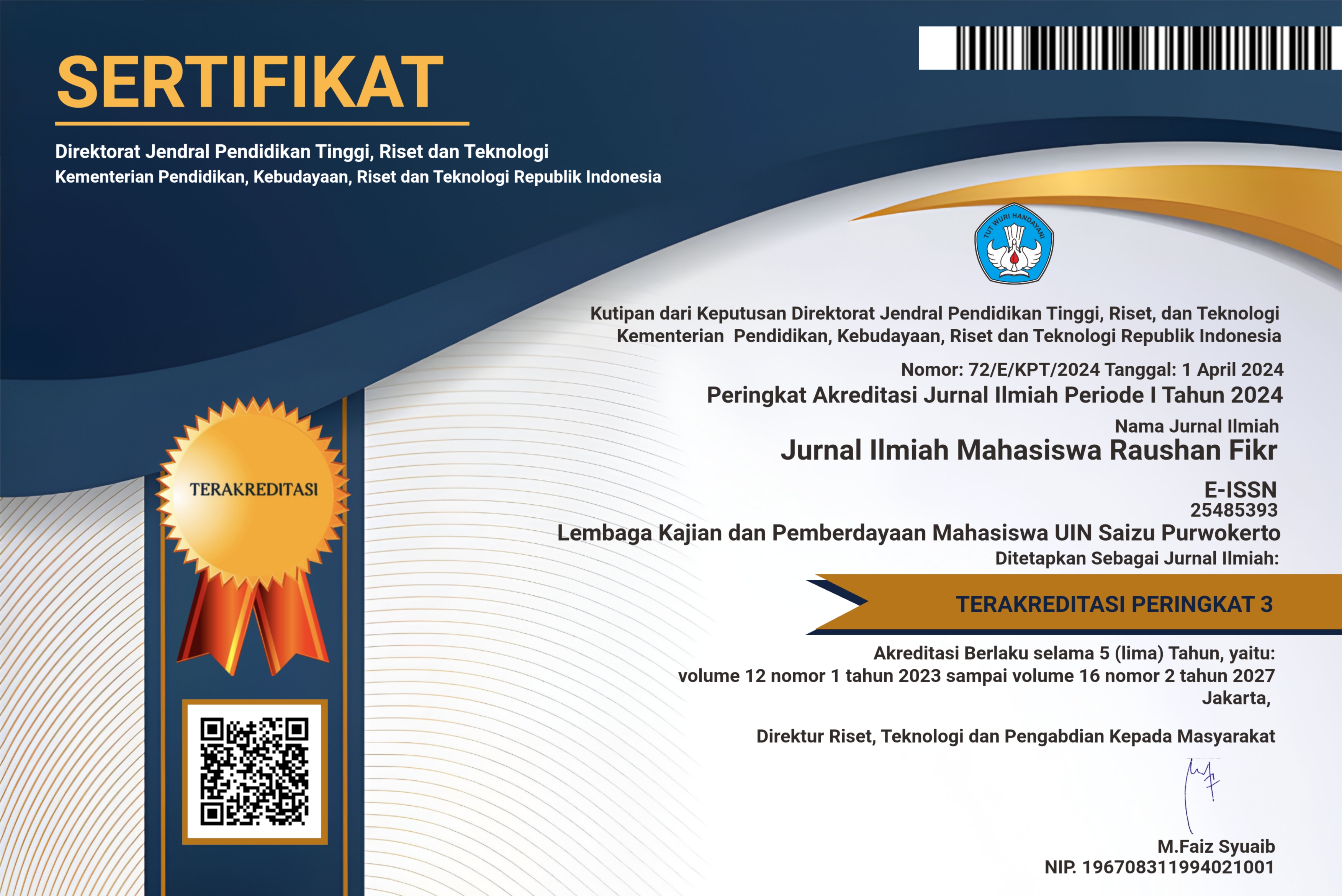Epistemology in Mulla Shadra’s Philosophy of Al-Hikmah Al-Muta’aliyah: an Analytical Review
DOI:
https://doi.org/10.24090/jimrf.v12i2.7549Keywords:
Mulla Shadra, Epistemology, al-Hikmah al-Muta’aliyahAbstract
This study aims to analyze and delve into Mulla Shadra’s views on epistemology and how these views are related to the concept of al-Hikmah al-Muta’aliyah. Analytical methods are employed to understand the philosophical arguments put forth by Mulla ShadraThis study showed that Mulla Shadra introduced an epistemology based on the understanding of al-Hikmah al-Muta’aliyah as the highest source of knowledge. He proposed that true knowledge could be attained through spiritual experience and contemplation, which includes self-understanding and the relationship with God. Intuition and revelation also play a crucial role in Mulla Shadra’s epistemology, where he emphasizes the importance of intuitive understanding as a profound source of knowledgeDownloads
References
,Badruzaman, D (2018). “THE DEVELOPMENT OF EPISTEMOLOGICAL PARADIGMA IN ISLAMIC PHILOSOPHY.” Idea: Journal of Humanities, November, 1-12. https://doi.org/10.29313/idea.v0i0.4168.
Fakhry, M (2001). History of Islamic philosophy: a chronological map / Majid Fakhry; translator, Zaimul Am; editor, Musa Kazhim. 1st ed. Bandung: Mizan.
Gunawan, Agung. 2019. “Mulla Sadra’s Thought on Al-Hikmah Al-Muta’aliyah and Its Relevance to Islamic Education.” Tsamratul Fikri | Journal of Islamic Studies 13 (2): 165. https://doi.org/10.36667/tf.v13i2.376.
Husein, S., Rahmani Astuti, & Mizan Editor Team (2002). Thematic encyclopedias of Islamic spirituality/editor, Seyyed Hossein Nasr; translator, Rahmani Astuti; editor, Mizan Editor Team. Mizan: Bandung.
MJS Channel, dir. 2020. Review of Philosophy 58: Mulla Shadra. https://www.youtube.com/watch?v=KiyacA84dE8.
Mustofa (1997). Islamic Philosophy: Mustofa. Pustaka Setia.
Mutahhari, M (1993). IMPORTANT THEMES OF ISLAMIC PHILOSOPHY. Translated by Hasan Rifa’i and Yuliani L. 1st ed. Bandung: Mutahhari Foundation. //library.uin-antasari.ac.id%2Fopac%2Findex.php%3Fp%3Dshow_detail%26id%3D7511.
Muthahhari, Murtadha, Jalaludin Rakhmat, and Muhammad al-Baqir. t.t. “Al-Hikmah: Journal of Islamic Studies No. 10 Muharram-Rabi’ Al-Awwal 1414/July-September 1993.” Mutahhari Foundation.
Nasr, Seyyed Hossein. 2014. Three major schools of Islamic philosophy: Ibn Sina, Suhrawardi, and Ibn ‘Arabi. IRCiSoD.
---. 2017. Al-hikmah al-muta’aliyah: Mulla Sadra. Sadra Press.
Nata, A (1995). Kalam Science, Philosophy and Sufism: Diraah Islamiyah IV. Raja Grasindi Persada.
Nur, S (2002). Mulla Sadra’s Philosophy of Being (UIN Antasari Banjarmasin Library). Yogyakarta: Student Library. //perpustakaan.uin-antasari.ac.id%2Fopac%2Findex.php%3Fp%3Dshow_detail%26id%3D14149%26keywords%3D.
Nurdin, N (2016). “Islamic Epistemological Thought of Muhammad Taqi Mishbah Yazdi.” Masters, State Islamic University of Alauddin Makassar. http://repositori.uin-alauddin.ac.id/1506/.
Salam, Andi Muhammad Ikbal, and Usri Usri. 2021. “Mulla Shadra’s Thought and Its Influence on Contemporary Philosophy.” Sang Pencerah: Scientific Journal of Muhammadiyah University of Buton 7 (4): 539–51. https://doi.org/10.35326/pencerah.v7i4.1552.
Saputra, Happy (2016). “MULLA SHADRA’S CONCEPT OF EPISTEMOLOGY” 18.
Saputra, S (2016). “Mulla Shadra’s Concept of Epistemology.” Substantia: Journal of Ushuluddin Sciences 18 (2): 183–96. https://doi.org/10.22373/substantia.v18i2.3005.
Downloads
Published
How to Cite
Issue
Section
License
Copyright (c) 2023 Intan Diana Fitriyati Fitriyati, Supriyanto

This work is licensed under a Creative Commons Attribution-NonCommercial-ShareAlike 4.0 International License.
Authors who publish with this journal agree to the following terms:
- Authors retain copyright and grant the journal right of first publication with the work simultaneously licensed under a Creative Commons Attribution-NonCommercial-ShareAlike 4.0 International License that allows others to share the work with an acknowledgement of the work's authorship and initial publication in this journal.
- Authors are able to enter into separate, additional contractual arrangements for the non-exclusive distribution of the journal's published version of the work (e.g., post it to an institutional repository or publish it in a book), with an acknowledgement of its initial publication in this journal.
- Authors are permitted and encouraged to post their work online (e.g., in institutional repositories or on their website) prior to and during the submission process, as it can lead to productive exchanges, as well as earlier and greater citation of published work (See The Effect of Open Access).
















